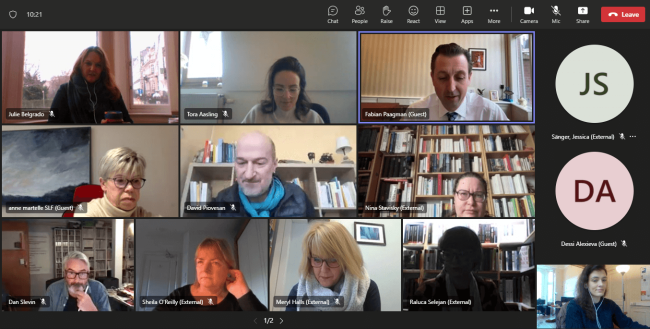
On 24 January 2023, representatives of EIBF’s member organisations reunited once again during this year’s first EIBF international call. The quarterly call allows members to share insights, struggles and progress from their respective countries.
EIBF members took turns sharing the latest developments in bookselling in their respective countries, looking back at last year’s sales.
Speaking about the latest sales figures in France, Anne Martelle (Syndicat de la librairie française, President) stated that in 2022, overall sales dropped by –7.1%, but were still up +7% on 2019. She pointed out that paperbacks have especially become popular, with a marked +14% increase in paperback sales in December 2022 compared to December 2021. The book market in France has also been dealing with issues surrounding the increase of book prices and the minimum book delivery fee law, supported by EIBF.
In Ireland, “more money was spent on books in 2022 than ever before,” said Sheila O’Reilly (Bookselling Ireland & the Booksellers Association of the UK & Ireland), highlighting the 8-year continuous growth of the Irish book market. Despite these numbers, Irish booksellers have experienced difficulties, as well, due to ongoing supply chain issues from the UK and rising energy and staff costs. Furthermore, 47% of Irish booksellers reported that the 2022 Christmas footfall was down on 2021. Meryl Halls (Booksellers Association of the UK & Ireland, Managing Director) reported that independent bookshops in the UK experienced a successful Christmas, with more than half of them reporting a sales increase over 2021. The Booksellers Association of the UK & Ireland also grew in membership, counting 1 072 members – the highest number in 10 years.
Sharing news about the Dutch book market, Anne Schroen (Koninklijke Boekverkopersbond, Managing Director) said that in 2022, there was a +2.7% increase in turnover, with online sales decreasing after their markable growth during the COVID-19 pandemic. Fabian Paagman, EIBF Co-President and owner of Paagman bookshops, mentioned the growing popularity of English-language books, which is proving to be somewhat difficult for Dutch publishers. English-language books are also gaining popularity in Finland, as reported by Laura Karlsson (Kirjakauppaliitto, Managing Director), who spoke about the Finnish book market, spotlighting the continuous growth of sales of audiobooks and e-books.
In Germany, 2022 sales in brick-and-mortar bookshops grew +4,8% on 2021, with customers paying more money per copy, but the overall number of copies sold being lower than in the previous years, as reported by Jessica Sänger (Börsenverein des Deutschen Buchhandels). According to the latest data, consumer confidence index in the country is currently very low. Moving further to the east of Europe, we heard from booksellers in Slovakia, Romania and Bulgaria. Ľudmila Jozefáková (Panta Rhei) spoke briefly about Panta Rhei, Slovakia’s largest bookshop chain, where the 2022 Christmas sales have not reached pre-pandemic levels from 2019. In Romania, bookseller and La Două Bufniţe’s co-owner Raluca Selejan shared insights about her bookshop, which received support from the Romanian government and managed to celebrate a successful end of 2022. Bulgarian booksellers also have a reason to celebrate, with 9% VAT rate for books becoming a permanent measure in the country, as reported by Desislava Alexieva (Bulgarian Book Association, President).
Our international tour didn’t stop in Europe: to conclude it, we were joined by Dan Slevin, CEO of Booksellers Aotearoa New Zealand, who spoke about latest developments at the New Zealand book market, spotlighting current challenges that Kiwi booksellers are facing, such as issues with storage or with finding experienced bookseller staff.
The international call presented a unique opportunity for EIBF members to meet, network and become inspired by progress in different countries - in Europe, but also on the other side of the world.
